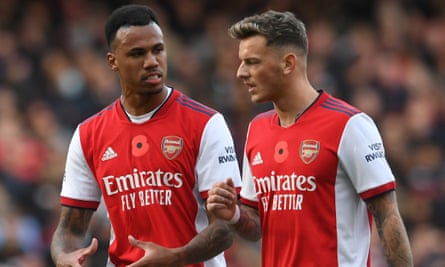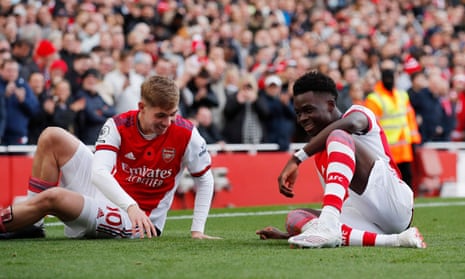The Premier League’s youngest squad have seen nothing yet, or so their manager would have it. Twelve weeks have passed since Arsenal were crushed at Manchester City and, pointless after three games, looked ripe fodder for footballing obituarists. They have barely put a foot wrong since and, when they walk out at Anfield late on Saturday afternoon, they will face their most serious test since the turnaround took shape.
“We haven’t experienced anything,” said Mikel Arteta when it was put to him that the level of expectation bestowed on his players, two points and one position shy of their fourth-placed opponents, could present too heavy a burden. “They’ve been together for two and a half, three months since we closed the transfer window. The group doesn’t have experience: the experiences they are living now have been quite positive since they all came together but it needs maturity, and hopefully that will come.”
In recent years, visits to Liverpool have been viewed as a test of Arsenal’s progress: an effort to glimpse green shoots at a venue that has become a nightmare hunting ground. They have tended to fall short and the figures, two points taken from the past eight visits with an aggregate score of 28-10 in the hosts’ favour, tell plenty of the story of almost a decade. But this time there is a sense Arteta’s camp travel with genuine belief rather than hope: statistics can, after all, offer diametrically opposing perspectives.
One of the most eyecatching is that, in the 35 fixtures played since Christmas Day last year, Arsenal have the fourth-best record in the division. It is virtually an entire campaign of Champions League performance, with the obvious caveat that the break between seasons increases the variables around measuring form, and they would be above Liverpool in that hypothetical league table. “That shows that if you break the calendar in a different way, we’d be challenging in those positions,” Arteta said. “Or we have the quality and we can show consistency there.”
If the weight of recent history is cast off, then perhaps this match is more akin to a clash of equals than it looks. Arteta would be justified in counting anything but defeat as another lived moment for a team he believes are so short of them: another challenge faced down by his back five, who are all 24 or under, and a front line sparked by the effervescence of Emile Smith Rowe and Bukayo Saka. The change in tone has been marked.
Much of this season’s improvement has been attributed to that youthful, athletic back line, in which Ben White and Gabriel Magalhães have dovetailed to formidable effect and Takehiro Tomiyasu has added stability on the right. Aaron Ramsdale’s influence, both as goalkeeper and cheerleader, has been palpable. But the picture has changed further forward too: once stodgy and creatively lacking, Arsenal now have more than one potent tool.
Over that 35-game sample, Pierre-Emerick Aubameyang has scored 11 of Arsenal’s 56 league goals. That can be assessed in two ways and there is certainly a case to make that the 32-year-old captain, who has delighted Arteta with his improved application off the ball, will shortly need to be the subject of a succession plan.
The other reading is that Arsenal have finally managed to curb their reliance on the striker: in 2019-20, the season in which Arteta took the reins halfway through, he contributed 22 of their 56 top-flight goals, and the previous campaign he produced 22 of 73. “Just to rely on one player is completely insufficient and it won’t be sustainable over time,” Arteta said in January, outlining that dividing the load was something to “address dramatically if you want to have any chance of competing with the top teams in this league”.

Arsenal need to be more prolific but they are no longer banking on their talisman to bail out poor performances. The vastly improved 11-month run coincides directly with Smith Rowe’s arrival in the team and the new England cap has added end product to his reliably high-octane offering since September: he has scored four times, matching Aubameyang’s tally for 2021-22, and his urgency has been crucial to the now-characteristic fast starts that blew away Spurs, Leicester and Aston Villa.
It is unlikely Liverpool will be seen off within 45 minutes but Arsenal look capable of asking serious questions, with Ramsdale and White having proved that their ability on the ball can expose teams who press. The latter’s capacity to slalom past players was critical to their recent win over Watford. They have come far enough that, if they flounder, it will be regarded as a blip rather than a damning exposé of systemic failures this time; Arteta’s demand, though, is that his team meet the moment.
“This club is about being the best, not even being fourth,” he said. The latter might suffice for now but, at long last, Arsenal may just have cause to expect.
